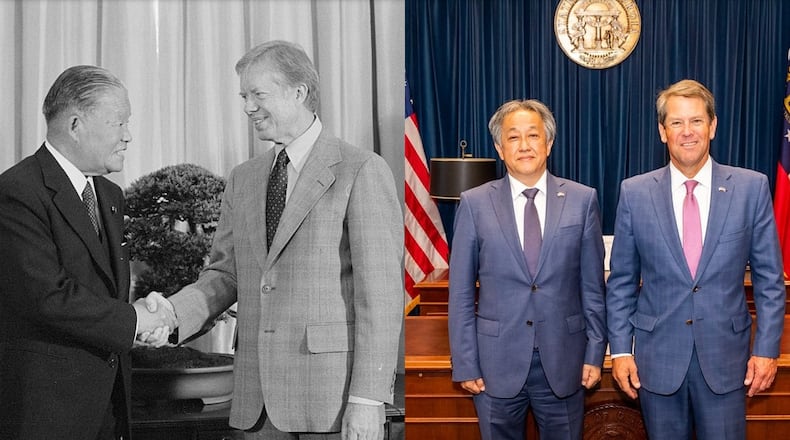Many of Georgia’s most important international business relations are firmly rooted in east Asia, but the genesis of those partnerships date back 50 years and involve a single country — Japan.
Before Jimmy Carter was elected to the Oval Office, he opened the door as governor for Japanese companies to set up shop in Georgia. By opening a trade and tourism office in Tokyo in 1973, Carter paved the way for foreign manufacturing to become a major employer across the state at a critical point when Georgia’s industry was mostly reliant on agriculture and textiles.
“For us to pivot and look to international relationships and open an office in Tokyo is a really big deal,” said Pat Wilson, the state’s economic development commissioner.
Wilson and other state leaders are continuing to focus on Georgia’s relationship with Japan, which today is the state’s sixth-largest international trading partner. The Peach State is also home to more than 400 Japanese companies, which employ more than 40,000 Georgians, but state dignitaries aim to increase that number.
Starting Thursday, the Georgia delegation will host multiple events in Tokyo as part of the annual Southeast U.S.–Japan Association, a longstanding trade and investment conference founded in 1976 by former Gov. George Busbee. Wilson and other state business recruiters will spend several days after the conference meeting with various Japanese companies to try to woo them down South.
“If you’re looking at international investment, there’s not a country that has been more vital to Georgia’s growth both economically and culturally than Japan,” Wilson said.
Macon landed the state’s first Japanese corporate factory in 1974 with zipper-maker YKK, a fitting partnership, given that the Middle Georgia city is known as “Cherry Blossom Capital of the World” with more than 300,000 Japanese trees.
Credit: Georgia Department of Transportation
Credit: Georgia Department of Transportation
Other companies would soon follow, with a few growing into some of the state’s largest private employers. Wilson said Japanese companies tend to be calculating, patient and deliberate, but “they’re all in” once they choose to invest.
Kubota Manufacturing, which makes farming equipment, came to Gainesville in 1988 with fewer than 40 employees. Several expansions later, and the company now boasts about 3,600 workers — more than Kia’s automobile factory in West Point.
“(Japanese companies) appreciate consistency, and they appreciate long-term commitment,” Wilson said. “We’ve proven that by continuing to go back over and over again.”
The Georgia delegation is scheduled to meet with Kubota, YKK and multiple companies that have existing Peach State presences. Yakult, a company known for fermented dairy drinks that announced a $305 million factory in Bartow County this summer, is also on the list.
“We’ll have a really good mix of different sectors of companies that we’re visiting,” said Nico Wijnberg, the state’s director of international relations and chief of protocol. “It’s a mix of existing industries as well as some potential new opportunities for Georgia.”
State leaders will also meet with companies including Subaru and Yanmar, which don’t currently have large operations in Georgia. Wilson said automobile and transportation companies are a priority because of the state’s emergence as a hub for electric vehicle manufacturing.
Credit: Consulate-General of Japan in Atlanta
Credit: Consulate-General of Japan in Atlanta
Georgia has recruited two multibillion-dollar EV factories alongside dozens of suppliers and battery producers. Most of that investment has come from the state’s largest international trading partner South Korea, a foreign relationship started in 1985 that borrowed a similar playbook from Japan.
Both Asian counties have been leaders in the electrification of transportation and the implementation of alternative fuel sources, such as hydrogen, which Georgia leaders are exploring.
“When you go to Japan and Korea, the future is now,” Wilson said. “They have built out ecosystems and are actually transporting goods via hydrogen… It’s something we can learn a lot from.”
About the Author
Keep Reading
The Latest
Featured





